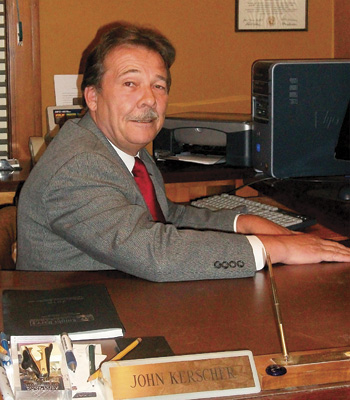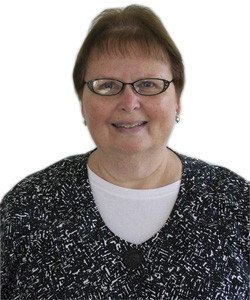 Wisconsin Lawyer
Wisconsin Lawyer
Vol. 83, No. 12, December 2010
by Dianne Molvig
 For anyone maneuvering through a rough patch in life, a Japanese proverb offers this bit of advice: Fall seven times, stand up eight.
For anyone maneuvering through a rough patch in life, a Japanese proverb offers this bit of advice: Fall seven times, stand up eight.
Those words describe the journeys of many Wisconsin lawyers who stumbled repeatedly due to addictions or mental illness but eventually landed on their feet. Still, these attorneys know the struggle to stay standing never ends. It requires a lifelong commitment and effort, and some help to stay on the path to recovery.
One source of support available to lawyers is the Wisconsin Lawyers Assistance Program (WisLAP), a member service of the State Bar of Wisconsin. WisLAP is based on the premise of lawyers helping lawyers.
Here three attorneys who either volunteer with WisLAP or are currently receiving WisLAP services share their stories.
‘I Took Away My Own License’
The first five years of Steve Compton’s law career unfolded like a map to sure success. After graduating in 1992 from Marquette University Law School, where he’d been editor of the Marquette Law Review, he got a clerkship with Wisconsin Court of Appeals Judge Ted Wedemeyer, followed by another clerkship with Wisconsin Supreme Court Justice Jon Wilcox. He spent two years at a Milwaukee firm before going to work for a firm in Janesville.
Then began a 12-year string of terrible decisions that would be Compton’s undoing. First, he started drinking too much in 1997. He also got a public reprimand from the OLR after he padded his hours in the state’s tobacco litigation. “I didn’t see anything wrong with that back then,” he says, “because it was pie-in-the-sky time for me.”
The stain on his reputation pushed him out of the Janesville firm, and he set up a solo practice in Delavan. Life was better. He felt less stress and stopped drinking. But after five years, “the grandiosity came back,” Compton says. He wanted to build his firm, so he merged with two other attorneys, and they added seven associates. Compton also had a number of outside business and financial interests.
“I was stressed out and felt I needed to work more,” he says. “There weren’t enough hours in the day. That’s when I resorted to cocaine.” He viewed cocaine as an energy booster, and he convinced himself it wasn’t physically addictive.
Using cocaine allowed Compton to drink more, he says. By the summer of 2007, he realized he was an alcoholic. He stopped practicing law and went into intensive outpatient treatment for alcohol abuse. “I stopped drinking on December 17, 2007,” Compton says. “We addicts and alcoholics remember those dates.”
But he kept using cocaine, which caused him to have trouble sleeping. Now that he wasn’t using alcohol, he figured he needed a new depressant. So, on Jan. 10, 2008, his 43rd birthday, Compton used heroin for the first time. “That began a real downward spiral,” he says. “Things started to go bad in a big way really fast.”
Six weeks later, he overdosed and landed in the intensive care unit at Mercy Hospital in Janesville. Despite several people urging him to get help, “I went back to doing the same thing I’d been doing,” he says.

Steve Compton became an alcoholic, was arrested for drug possession, and lost his law license. He’s now in a monitoring contract with WisLAP and an intensive recovery program. “I feel I took away my own license. … I want to prove to myself that I can also be the person to get it back.” Physical fitness is now his passion.
A year later, Compton got arrested for possession of heroin and cocaine. Then, because of a ridiculous scheme to attempt to get a girlfriend and fellow addict out on bail, he got hit with a bail-jumping charge and ended up in jail on a $100,000 cash bond in March 2009. After he’d spent 45 days in jail, his parents agreed to bail him out on one condition: His lawyer had to pick up Compton from jail and deliver him directly to the Herrington Recovery Center at Rogers Memorial Hospital in Oconomowoc. There, at last, Compton began to break free from the downward spiral.
“I’d suffered enough consequences and public humiliation by this time so that I’d finally hit rock bottom,” Compton says. “I knew I was losing my wife of almost 20 years [she filed for divorce in February 2009]. I knew I was going to lose my license to practice law and my relationship with my two sons. It was enough for me to finally get serious, dig deep, and work hard at getting clean.”
He completed his recovery program at Herrington, and a few months later, in October 2009, he voluntarily entered into a five-year monitoring contract with WisLAP. The contract requires that he stay clean and sober; attend at least two recovery meetings each week; check in weekly with his monitoring counselor, WisLAP coordinator Linda Albert; and meet in person with Albert once a month. He’s subject to random drug screens at any time. Compton also continues to see a drug counselor on his own volition, and he has a probation officer, both of whom also monitor his progress.
Compton has been abstinent from alcohol for three years, and he hasn’t used drugs for nearly two years. “I recognize that I’m a drug addict and alcoholic,” he says. “I need to stay in a recovery program for the rest of my life. That’s not a burden; it’s a blessing. I’ve never been happier in my life. I’m more physically fit than I’ve been in 25 years. I have a great relationship with my boys. My friends see me as a much better person and a good father. I’m so thankful.”
There’s another part of his life Compton hopes to recover: practicing law. He’ll be eligible to apply for reinstatement in 2012. “I loved being a lawyer,” he says. “I feel I took away my own license. No one took it from me. I want to prove to myself that I can also be the person to get it back.”
‘I Thought It Just Mellowed Me Out’
John Kerscher’s personal and professional life began to dissolve in alcohol in the 1990s. “It started slowly and got progressively worse,” says Kerscher, a Manitowoc attorney. “It just snuck up on me.”

About 18 months ago, John Kerscher completed a WisLAP monitoring contract requiring him to maintain sobriety and treatment for depression. He’s rebuilding a law practice, and just celebrated 10 years in recovery. “Above all, I have to be sure I stay involved in my recovery program. Without my sobriety, I have nothing.”
At the beginning of the 1990s, Kerscher had been practicing law for 18 years in Racine, was happily married, and was highly regarded in the community for his professional and civic involvements.
By 2000, he’d collected six OWIs and done time “in jails from Waukegan to Manitowoc,” he reports. He’d also sabotaged his marriage, stopped practicing law, and gained a reputation in his community for being a drunk.
“I’m no longer a drunk,” Kerscher says. “I’m still an alcoholic.” He hasn’t had a drink in 10 years. He began volunteering with WisLAP about nine years ago to help other attorneys battling addictions. Recently he received special training to become a monitor in a new WisLAP program (see the accompanying sidebar “WisLAP Launches New Support and Monitoring Program”).
For Kerscher, the path to alcoholism began in mid-life. Having grown up as the son of teetotalers, Kerscher drank moderately while in college and on through his 30s. But by his late 40s, he was drinking heavily.
“I thought alcohol just mellowed me out,” he says. “It took away all the stresses and pressures of the day and allowed me to relax at night. Then I needed more and more to reach that point of mellowness. Pretty soon, I never reached it.”
Early on, his family turned to WisLAP for an intervention, but Kerscher admits he wasn’t ready for help. “My stubbornness and delusional thinking had a hold on me,” he says. “I didn’t recognize how severe my problem was.”
He got his first OWI in 1995 and, finally admitting he had a problem, he went into treatment. He stopped practicing law in 1996 and focused on getting well.
“I’ve been in some of the best treatment programs in the nation,” he says. “I’d stay sober for a while. Then that feeling of unease or anxiousness or frustration would be back and I’d think, ‘Well, I’ll just mellow out a little bit.’ The drinking would get bad again.”
This cycle went on for another five years. Somewhere along the line, depression also became a problem for Kerscher. Alcoholism and depression “go hand in hand,” he notes.
Finally, after getting a felony drunk-driving conviction for his sixth OWI in 2000, Kerscher earned a year in the Manitowoc County jail. He figures he was lucky. “It was enforced abstinence,” he says. “I was able to focus on me and what I needed to do to arrest my disease.” Also lucky, he adds, was the fact that with his six OWIs, he’d never had an accident or hurt or killed anyone.
This time Kerscher was serious, finally, about maintaining abstinence from alcohol. For the first 18 months after completing his one-year jail sentence, he continued to attend recovery meetings twice a day. Now he still goes to one meeting daily, sometimes more.
Kerscher volunteered to have his law license suspended in 2001, knowing it would be suspended anyway due to the felony drunk-driving conviction. In late 2002, he applied to the Wisconsin Supreme Court for reinstatement, but he was denied. The Office of Lawyer Regulation (OLR) recommended against reinstatement, believing Kerscher didn’t have a sufficient recovery track record. He reapplied a year later, and in February 2004 regained his license, with conditions.
Those conditions included that he maintain sobriety and show proof of compliance with a treatment regimen for his depression. He was subject to random breathalyzer and urine tests, and his probation officer also checked on him. The OLR assigned a monitor, a fellow attorney, to keep tabs on Kerscher’s sobriety and how well he was managing his law practice. He completed his monitoring contract about 18 months ago.
Now living in Manitowoc, where he was born and raised, Kerscher is gradually building his law practice and getting involved with community organizations. “But, above all, I have to be sure I stay involved in my recovery program,” he says. “Without my sobriety, I have nothing.”
‘Not Being Able to Practice Was Devastating’

Severe depression made working a full-time job impossible for Claremarie Gillis.
“To end up less than 10 years after completing my law degree not being able to practice was devastating.”
With help, she is rebuilding a family law practice and continuing to serve lawyers as a WisLAP monitor and peer counselor.
Claremarie Gillis thought she had pieced together the life she’d dreamed of creating, and it hadn’t been easy. At age 40, having left an abusive marriage and becoming a single mom of two teenagers, she enrolled in the U.W. Law School. After graduation in 1997, she went to work for a small Manitowoc firm, where she chose to practice family law. She wanted to use her legal skills and the empathy gained from her own life experiences to help others deal with difficult family situations.
Her new career gave Gillis and her children a measure of financial security they’d never known. Before law school, she’d worked 70 to 80 hours a week managing a restaurant and barely got by financially.
“I didn’t become a lawyer because I wanted to be a millionaire,” she says. “I wanted to get past living paycheck to paycheck. I wanted to be able to take a vacation once a year without worrying about how to pay for it.”
For the first time, Gillis was able to buy a home for her family. But just when Gillis had begun to envision better days, her life started to come apart at the seams.
Her first bout with depression occurred in the mid-1980s, while she was still married and several years before law school. One day she blacked out in the office of the restaurant where she worked. Doctors diagnosed her as having depression and told her that with each recurrence, subsequent episodes would be more likely and more frequent. They surmised the roots of her depression lay in her abusive marriage and the stress of working long hours.
Once she started practicing law, the depression gradually became more severe, even though Gillis continued to seek professional help. “The natural stress levels in law practice and especially in the family law area, combined with my own personal issues, took a toll on my overall health,” she says. Counseling and medications helped her to cope and to continue practicing for eight-plus years. She used all her sick leave and vacation time to get through the worst periods.
Her firm was extremely supportive, she says. Even so, she believes many people probably couldn’t truly comprehend what she was enduring. She describes a severe depressive episode as being a time of “complete exhaustion – mentally, physically, and emotionally.”
Eventually, working a full-time job became impossible. Gillis switched to working half time under contract with Calumet County, handling child support and chapter 51 cases. The depressive episodes became much milder and more widely spaced. But after eight months, Gillis realized she had to return to full-time work for financial reasons. She took a job as a staff attorney with the Brown County Corporation Counsel in November 2004. “For 11 months, I put all the energy I had into getting to work, getting through my days, and getting home again,” she says.
By September 2005, Gillis realized she couldn’t keep working, and eventually she went on Social Security disability. “My doctors were amazed I had continued to practice as long as I had,” she says. “I just kept fighting. I’ve always been a fighter. I grew up in a family of 17 children.”
Unable to work, Gillis suffered a tremendous sense of loss. She lost friends who didn’t understand what she was going through. Her high COBRA payments to cover health insurance plus her medical expenses caused her to lose her home to foreclosure. What’s more, “to end up less than 10 years after completing my law degree not being able to practice was devastating,” she says.
Now, five years later, Gillis has regained some ground. She needs to take only one low-dose depression medication and continues with counseling. The Wisconsin Department of Vocational Rehabilitation is helping her to gradually build a practice focusing on pro se divorce cases. Working only with parties who agree on all issues, she provides legal advice and takes care of their paperwork. “It’s low stress,” she says. “It’s a way to utilize my skills, provide a service, and take care of myself at the same time.”
She also recently completed training to be a WisLAP monitor and has been a WisLAP peer counselor since the beginning of her law career.
What lies ahead for her? “I would love nothing better than to be thriving in my business, working full time, and not needing Social Security disability at all,” Gillis says. Still, she knows she may have to rein in such ambitions to stay well. “That’s what my doctor has helped me to come to accept,” she says. “That’s pretty much my reality.”
Wisconsin Lawyer
